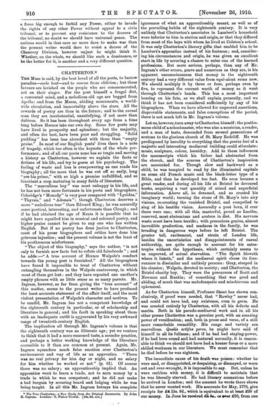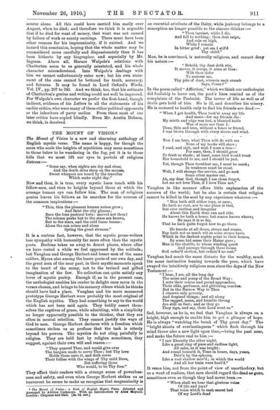CHATTERTON.*
Tina Muse is said, by the best loved of all the poets, to bestow paradise—coe/o beat—and to rescue from oblivion ; but these favours are lavished on the people who are commemorated, not on their singer. For the poet himself a frugal diet, a contented mind, and a melodious old age are begged from Apolle.: and from .the Muses,_ abiding monuments, a world- wide circulation, and immortality above the stare. All the rewards of poetry are thus in the future; and to the, carnal man they are insubstantial, unsatisfying, if not more than dubious. So it has been throughout every, age from a time long before Horace into our own day. Spine few poet's may have lived in prosperity and splendour; but the majority, and often the best, have been poor and struggling. "Solid pudding" has been less abundant with them than "empty praise." In most of our English poets' lives there is a note of tragedy, which too often is the keynote of the whole per- formance; and of alt our poets none has so tragic and moving a history as Chatterton, however we explain the facts or fictions of his life,. and try to guess at his psychology. The feeling of waste and loss is overpowering as one reads his biography.;, all the more that he was cut off so early, long "ere his prime," with so high a promise unfulfilled, and so luxuriant A crop maturing in many fields of literature. ,
The "marvellous boy" was most unhappy in his life, and he has not been more fortunate in his poets and biographers. Coleridge's "Monody" is very poor compared with "Lycidas," " Thyrsis," and " Adonais ":, though Chatterton deserves a more "melodious tear" than Edward King ; be was assuredly more poetical, interesting, and unfortunate than Clough; and if he had attained the age of Keats it is possible that he might have equalled him in musical and coloured poetry, and higher praise cannot be given to any one who has written English. But if no poetry has done justice to Chatterton, most of his prose biographers and critics have done him grievous injustice ; and the present volume is not the least of his posthumous" misfortunes.
"The object of this biography," says the author, "is not only to furnish new facts but to refute old falsehoods " ; and he adds A true account of Horace Walpole's conduct towards the young poet is furnished." All the biographers have found it impossible to treat of Chatterton without entangling themselves in the Walpole controversy, in which most of them get lost : and they have repeated one another's empty phrases with as little sense as so many parrots. Mr. Ingram, however, so far from giving the "true account" of this matter, seems to the present writer to have produced the least accurate statement of the affair itself, and the most violent presentation of Walpole's character and motives. To be candid, Mr. Ingram has not a competent knowledge of the eighteenth century, in particular, or of scholarship- and literature in general; and his fault in speaking about them with an inadequate outfit is aggravated by his very awkward usage of twentieth-century English.
The implication all through Mr. Ingram's volume is that
the eighteenth century was an illiterate age; yet we venture to think that it had a more reasoned taste, a sounder practice, and perhaps a better working knowledge of the literature accessible to it than are common at present. Again, Mr. Ingram squanders much false emotion over Chatterton's environment and way of life as an apprentice. "There was no real privacy for him day or night, and no salary for him whether he worked or not" (p. 61). Of course there was no salary ; an apprenticeship implied that. An apprentice went to learn a trade, not to earn money by a trade in whit% he was competent; and he did, not make a bad bargain by securing board and. _lodging while he was being taught. In all this Mr. Ingram betrays his complete • The True Chatterton : a New Study from the Original Documents. By John H. Ingram. London: T. Fisher lInwin. [10s. 6d. net.] ignorance of what an apprenticeship meant, as well as of the prevailing habits of the eighteenth century. It is very unlikely that Chattertpn's associates in Lambert's household were inferior to him in station and origin, or that they differed from most of the boys with whom he lived at Colston'e school. It was only, Chatterton's literary gifts, that enabled him to be Lambert's apprentice instead of his foptman ; and, consider- ing his, circumstancee and origin, he wile given an .excellent start in life by securing at chance to enter one of the learned professions, But wore serious, perhaps, than, any of Mr, Ingram's other errors, grave and numerous as they are, is his apparent uneonsciousnese that money in the eighteenth century had a very different value from equivalent sums now. Weshould multiply it by three or, four, perhaps even by five, to represent the current wprth of money; as it went through Chatterton's hands. This has a most important bearing on his fate, as we shall explain ,presently, and We think it has not been considered sufficiently by Any, of his biographers. When we have allowed for unproved, assertions, disprovable statements, and false conceptions of the period, there is not ranch left in Mr. Ingram's volume.
Let us, however, turn away to Chatterton himself: the posthu- mous child of a schoolmaster, who was also a musician, a reader, and a man of taste, descended from several generations of eextons to the glorious church of St. Mary Redcliff. He was predisposed by heredity to everything, that, the genius loci, of a majestic and interesting mediaeval balding could stimulate music, sculpture, colour, heraldry, Add to these influence the manuscripts which his father had abstracted from the church, and the sources of, Chatterton's inspiration are, accounted for. Though slow and backward as a child, he was tempted. to read by the illuminated capitals on some old French music and the black-letter type of a Bible, and then he developed too fast. He soon became a great reader, and during all his ;life at Bristol he devoured books, aequiring a vast quantity of mixed and superficial information, Above an, he dreamed, and so created his imaginary world; turning the stone of St. Mary's into airy visions, re-creating the vanished Bristol, and compelled te sing of his beatifie vieipn. Assuredly a poet born, if ever there were one; with all this, masterful, proud as Lucifer, reserved, most abstemious and austere in diet. His nervous waste must have been terrific; with precocious genius,, almost incredible production, and madness in the family, he was treading in dangerous ways before he left Bristol. The greater toil, excitement, and strain of London life, besides the uncertainties and disappointments of casual authorship, are quite enough to . account for his catas- trophe without the hypothesis, which certainly seems to us unproved, of actual starvation. "The Spirit .bloweth where it lititeth," and the mediaeval spirit chose its fore- runners in dissimilar and unlikely persons : Gray, steeped in his classics; Walpole, devoted to society; and chatterton, the Bristol charity boy. They were the precursors of Scott and Newman and Ruskin; of something that was good and abiding, of much that was melodramatic and mischievous and ephemeral.
As for Chatterton himself, Professor Skeat has shown con- clusively, if, proof were needed, that " Bewley " neyer had, and could not have had, any . existence, even in germ. He was created entirely by Chatterton, with all his defects and merits. Both in hie pseudo-mediaeval work and in, all his other poems Cliattertonwas a genuine poet, with 432 amazing power of versification; and, both in prose and verse, of a still more remarkable versatility. His range and variety are marvellous. Qualls artifea pane; he might have said of himself in all its fullnees ; and if he had had staying-power, if he ha4 been sound and had matured normally, it is reason- able to think we should not have had a keener force or a more skilledworkinan in our literature. We must remember that he died before he was eighteen.
The immediate cause of his' death was Poison: whether he were mad, or disappointed, or despairing, or dismayed, or worn out and over-wrought; it is impossible, to say. But, unless he were reckless with money, it is difficult to maintain that he was literally starved. He had literary connexions before he arrived in London; and the amount he wrote there shows that he never wanted work. His accounts for May, 1770, give receipts for £4 1,5s. 9d., which is equivalent-to at least £20 of our money. In June he received RA be., or giveir £20, from one source alone. All this could have carried him easily over August, when he died; and therefore we think it is arguable that if he died for want of money, that want was not caused by failure of work or scanty earnings. There must have been other reasons for his impecuniosity, if it existed. And we hazard this conclusion, hoping that the whole matter may be reconsidered more carefully and dispassionately than it has been hitherto by any biographer, and especially by Mr. Ingram. Above all, Horace Walpole's relations with Chatterton seem to us generally misstated, and his whole character misunderstood. Into Walpole's dealings with him we cannot unfortunately enter now; but his own state- ment of the case cannot be bettered for truth, accuracy, and fairness. It may be found in Lord Orford's Works, VoL IV., pp. 207 to 245. And we think, too, that his estimate of Chatterton's genius and writing could not well be improved. For Walpole's own character we prefer the first-hand, though indirect, evidence of his Letters to all the statements of his earlier critics, who were many of them either political opponents or the inheritors of party malice. From them most of our later critics have copied blindly. Even Mr. Austin Dobson, we think, is deceived.



















































 Previous page
Previous page